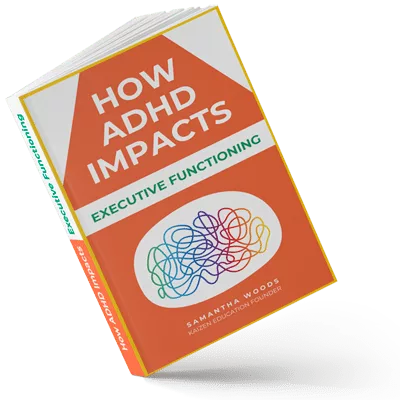I still get a blank stare when I say I work with students with executive functioning challenges. It all clears up when I explain that I work with students and adults who have ADHD.
It goes something like this:
Person at a BBQ party: What do you do for a living?
Me: I am the founder of a social enterprise specializing in supporting learners with executive functioning development.
Person at party: Hmmm…so, like, you teach kids how to become business owners?
Me: Not really, but it is relevant. Executive skills are a challenge for a lot of students who have an ADHD diagnosis. They include skills such as time management, organization, attention/focus, emotional regulation and task initiation. Executive skills can be compared to the CEO of a company – they are responsible for making all of the departments work in harmony so that the company can succeed.
Person at party: I wish I had been taught these things as a kid. So how do you DO that?

What are executive functioning skills?
Executive functioning skills refer to the brain-based cognitive processes that help you regulate your behaviour, make decisions, and set and achieve goals. The prefrontal cortex manages executive functioning.
Think of executive functioning as the brain’s self-management system. The prefrontal cortex can be compared to an orchestra conductor or an air traffic controller. It ensures all the “instruments” play well and are synchronized to play beautiful music. Or, in the case of the air traffic control center, this hub of the brain coordinates flight paths so that aircraft can land safely (and maybe even on time!) Everything runs smoothly UNTIL the conductor calls in sick or the air traffic controller steps away, and chaos ensues in the concert hall or in the air.
You get the idea. You rely on your executive functions every day, from planning out the day and remembering to pack lunch to mapping out your next road trip. (Anything to avoid those flight delays!)
We often take these skills for granted. After all, we use them all the time. It’s like blinking! We assume that everyone has these skills, including children and teens. We expect children will naturally learn how to organize, stay on task, prepare and plan. But executive function skills are learned skills.
Children are not born with executive functioning skills. Instead, children are born with the potential to gradually develop well into adulthood. And for children with ADHD, executive functioning skill acquisition can be delayed up to 30% of their chronological age. This means a 12-year-old with an ADHD diagnosis is likely to be functioning at an executive age of 8.4. This can be a root cause of stress, anxiety, shame, and frustration at home and school. Understanding this is critical for parents and educators as they seek to support and develop executive functioning skills.
What skills are included in “Executive Skills?”
There are various categorizations of executive functioning, but I like the list developed by Dr. Peg Dawson & Dr. Richard Guare as it is the most comprehensive, and the skills are listed in order of development (Dawson, P., & Guare, R., 2008).
Impulse Control
What is it?
The capacity to think before you act, rather than reacting on a whim.
Examples:
A young child should be able to wait a short period without interrupting.
A middle school child resists blurting out an answer in class.
Working Memory
What is it?
The ability to hold information in memory and juggle multiple pieces of information at once.
It allows us to draw on past learning and experience to apply to the situation at hand.
Example:
Remembering different expectations of teachers or the multiple steps involved in solving a math problem.
Emotional Control
What is it?
The ability to manage emotions to achieve goals and complete tasks, even when things are tricky.
Example:
Managing anxiety during a game or test.
Focused Attention
What is it?
Maintaining sustained attention and tune out distractions despite fatigue or boredom.
Examples:
A young child, completing a 5-minute task with occasional supervision.
A teenager attending to homework, with short breaks, for 45-60 minutes.
Task Initiation
What is it?
The ability to begin projects without procrastinating in an efficient fashion.
Example:
Starting a chore right after the instructions are given.
Not waiting until the last minute to begin a large project.
Planning & Prioritizing
What is it?
The ability to create a roadmap to reach a goal or complete a task and deciding which ones to tackle first.
Examples:
Plan a project based on deadlines.
Planning a series of tasks to be completed within a certain time period.
Organization
What is it?
The ability to create and maintain systems to keep track of information or materials, both inside and outside the brain.
Examples:
A young child, with a reminder, can put toys in a designated place.
A middle school child can organize and locate sports equipment.
Time Management
What is it?
The capacity to estimate how long tasks will take and how to allocate time accordingly.
Example:
Completing a short task or series of tasks within a time limit set by an adult.
Self-Motivation
What is it?
The capacity to have a goal and follow through on its completion.
Examples:
A young child can complete a task in order to play with a friend.
A middle school student can save money over time to buy something they value.
Flexible Thinking
What is it?
The ability to adapt thinking and problem-solving approach depending on situation changes.
Examples:
Adjusting to change without major distress.
Accepting an alternative position on a sports team.
Self Awareness
What is it?
The ability to stand back and take a separate view of oneself in a situation.
This includes self-monitoring and self-evaluative skills like asking “How am I doing?” or “How did I do?”
Examples:
A young child can adjust behaviour in response to feedback from an adult.
A middle school child can self-edit or double check their own work.
~Adapted from Dawson, P., & Guare, R. (2008). Smart but scattered. Guilford Publications.
What do parents and educators need to know about executive functioning skills?
Children with weak executive skills can be disorganized or forgetful. They may need help starting tasks and get distracted easily. The good news is that these skills are learnable! With patience, practice, persistence, and, most importantly, positivity, adults can foster the development of these essential skills in their children so they can experience success in school, work, and life.
The biggest takeaway should be not to overlook the importance of executive functioning skills.
Not sure how to help your child develop their executive functioning skills? Check out our posts explaining tried-and-true methods and techniques:

